By Leen Randell
Updated: Jul 04, 2024
10 Best Herbal Decoctions For Joint Stiffness
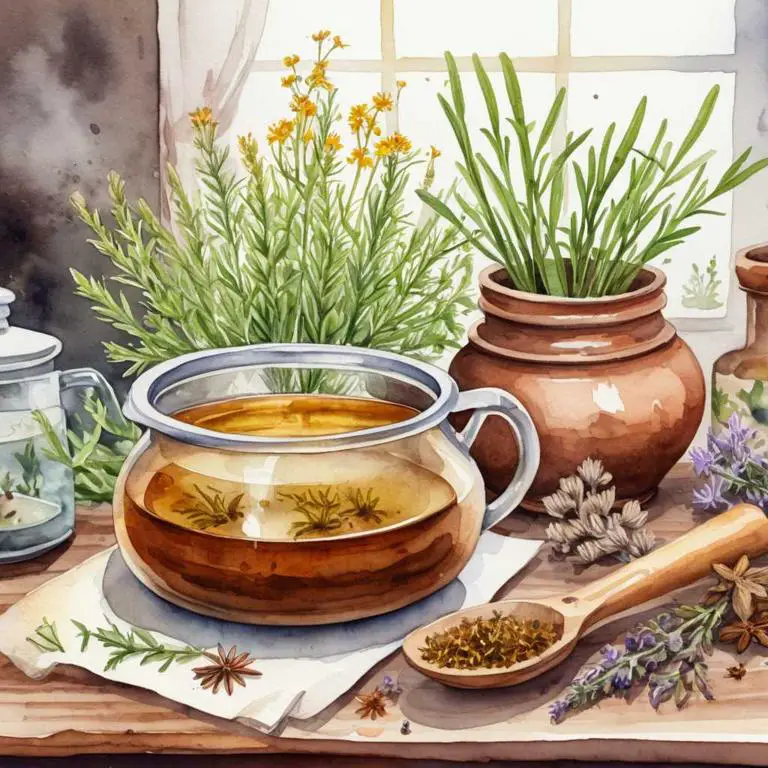
Herbal decoctions for joint stiffness are concentrated liquids made by steeping herbs in hot water, which provide a natural and effective way to alleviate joint discomfort.
These decoctions help by reducing inflammation, relieving pain, and improving flexibility. Examples of herbal decoctions that benefit joint stiffness include turmeric and ginger, which have anti-inflammatory properties, and willow bark, which contains salicylic acid similar to aspirin.
By drinking these decoctions regularly, individuals with joint stiffness can experience improved mobility, reduced discomfort during activities, and enhanced overall quality of life.
The following article describes in detail the most important decoctions for joint stiffness, including medicinal properties, parts of herbs to use, and recipes for preparations.
- 1. Glycyrrhiza glabra
- 2. Curcuma longa
- 3. Harpagophytum procumbens
- 4. Boswellia serrata
- 5. Zingiber officinale
- 6. Withania somnifera
- 7. Urtica dioica
- 8. Salix alba
- 9. Sambucus nigra
- 10. Yucca schidigera
- What is the best combination of herbal decoctions to use for joint stiffness?
- What ailments similar to joint stiffness are treated with herbal decoctions?
1. Glycyrrhiza glabra
Licorice decoctions helps with joint stiffness because they contain glycyrrhizin, a compound that has anti-inflammatory properties.
When consumed as a warm drink, this decoction can help reduce inflammation and alleviate pain associated with stiff joints. Additionally, licorice root is rich in antioxidants that help protect the joints from oxidative stress and damage caused by free radicals.
By reducing inflammation and promoting joint health, licorice decoctions can provide relief from joint stiffness and promote comfortable movement.

Medicinal Constituents
The list below shows the primary medicinal constituents in Glycyrrhiza glabra decoctions that help with joint stiffness.
- Licoricidin: Licoricidin is a flavonoid glycoside that exhibits anti-inflammatory and antioxidant properties, which help reduce joint inflammation and alleviate stiffness.
- Glycyrrhizin: Glycyrrhizin is a triterpenoid saponin that has potent anti-inflammatory effects by inhibiting the production of pro-inflammatory mediators, thereby reducing joint pain and stiffness.
- Liquiritigenin: Liquiritigenin is a flavanone that possesses anti-inflammatory and analgesic properties, which help reduce joint inflammation and alleviate pain associated with joint stiffness.
Parts Used
The list below shows the primary parts of licorice used to make decoctions for joint stiffness.
- Roots: The roots of Glycyrrhiza glabra are the most commonly used part for making decoctions to alleviate joint stiffness due to their high glycyrrhizin content, which has anti-inflammatory properties.
- Barks: The barks of Glycyrrhiza glabra are also used to make decoctions for joint stiffness, as they contain glycosides and other compounds that help reduce inflammation and pain.
- Leaves: The leaves of Glycyrrhiza glabra are occasionally used to make decoctions for joint stiffness, due to their minor amounts of glycosides and other compounds that may contribute to their anti-inflammatory effects.
Quick Recipe
The following recipe gives a procedure to make a basic licorice for joint stiffness.
- Gather 30 grams of dried glycyrrhiza glabra roots and wash them in cold running water for 5 minutes.
- Cut the glycyrrhiza glabra roots into small pieces and soak them in 1 liter of water for 30 minutes.
- Heat the soaked glycyrrhiza glabra mixture over medium heat for 5 to 7 minutes.
- Reduce the heat to low and simmer the glycyrrhiza glabra mixture for 10 to 15 minutes.
- Strain the glycyrrhiza glabra decoction through a cheesecloth or a fine-mesh sieve and discard the solids.
2. Curcuma longa
Turmeric decoctions helps with joint stiffness because it contains a powerful compound called curcumin, which has potent anti-inflammatory properties.
When consumed as a decoction, turmeric's active ingredients are released into the bloodstream and absorbed by the body, targeting inflamed joints and reducing stiffness and pain.
The decoction also increases blood flow to the affected areas, further aiding in the reduction of stiffness and promoting overall joint health.
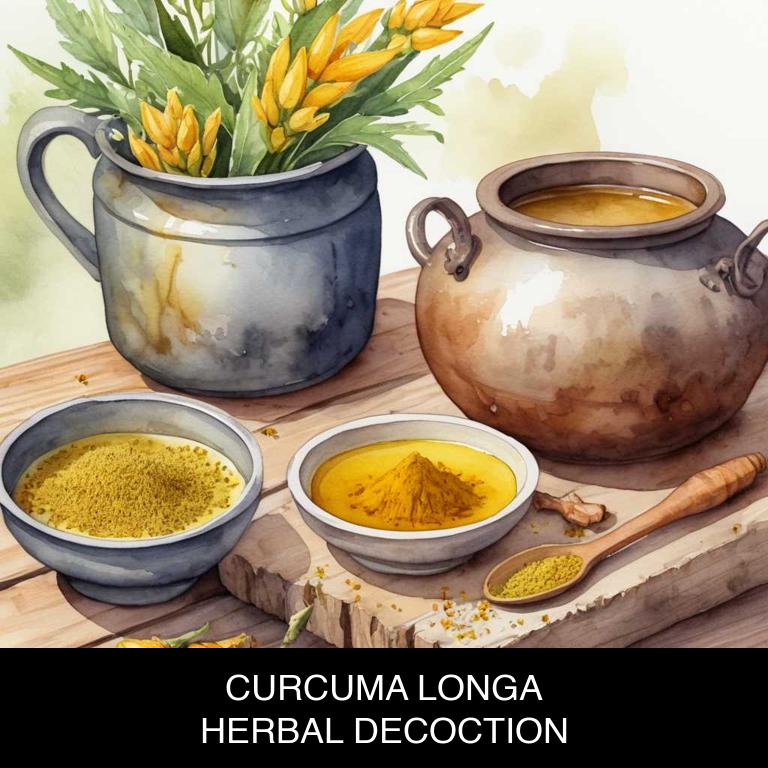
Medicinal Constituents
The list below shows the primary medicinal constituents in Curcuma longa decoctions that help with joint stiffness.
- Curcumin: Curcumin is a potent polyphenol compound that inhibits pro-inflammatory enzymes and cytokines, thereby reducing joint inflammation and alleviating stiffness.
- Demethoxycurcumin: DMC is a demethylated analog of curcumin that has been shown to have anti-inflammatory and antioxidant properties, helping to reduce joint pain and stiffness.
- Turmerone: Turmerone is a sesquiterpene that has been found to have anti-inflammatory and analgesic effects, helping to reduce joint pain and stiffness by inhibiting the production of pro-inflammatory mediators.
Parts Used
The list below shows the primary parts of turmeric used to make decoctions for joint stiffness.
- Leaves: The leaves are used in some decoctions, although to a lesser extent, as they contain smaller amounts of curcumin and other beneficial compounds that may still contribute to joint health.
Quick Recipe
The following recipe gives a procedure to make a basic turmeric for joint stiffness.
- Crush 1-2 teaspoons of dried curcuma longa root into a fine powder using a mortar and pestle.
- Combine the powdered curcuma longa with 1 cup of water in a small saucepan.
- Heat the mixture over low heat for 5-7 minutes or until the liquid reduces slightly stirring occasionally.
- Strain the decoction through a cheesecloth or fine-mesh sieve into a clean container.
- Allow the decoction to cool to room temperature before storing in an airtight container for later use.
3. Harpagophytum procumbens
Devil's claw decoctions helps with joint stiffness because of its unique combination of bioactive compounds, including harpagosides, which have potent anti-inflammatory properties.
These compounds work to reduce inflammation and swelling in the joints, alleviating pain and discomfort caused by arthritis, gout, and other joint disorders.
Additionally, devil's claw has been shown to increase mobility and flexibility, making it an effective natural remedy for individuals seeking relief from joint stiffness.
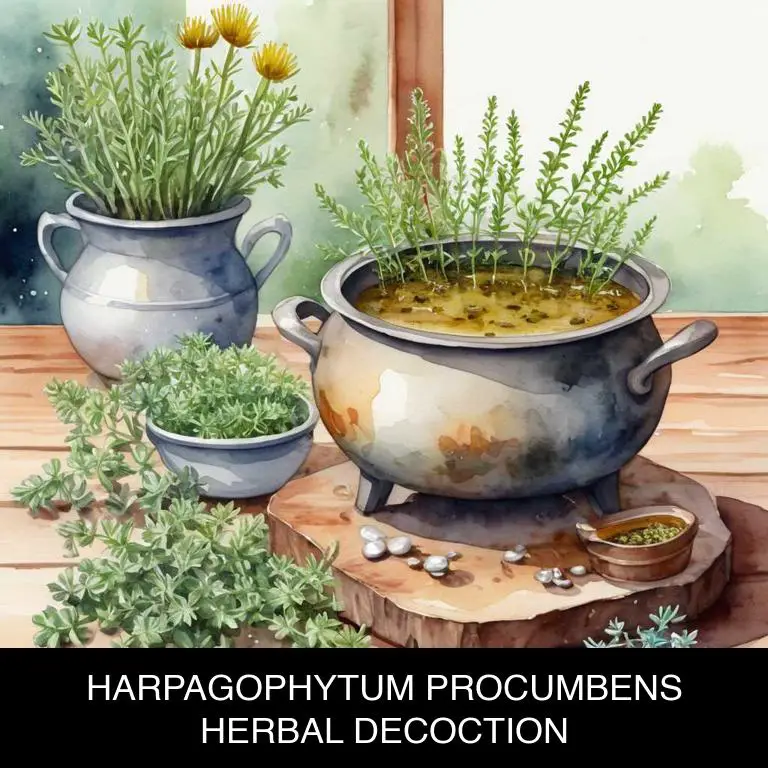
Medicinal Constituents
The list below shows the primary medicinal constituents in Harpagophytum procumbens decoctions that help with joint stiffness.
- Harpagide: Harpagide helps with joint stiffness by reducing inflammation and pain due to its anti-inflammatory properties, which inhibit the production of pro-inflammatory enzymes.
- Procumbides: Procumbides act as a potent anti-inflammatory agent, helping to alleviate joint stiffness and pain by inhibiting the activity of inflammatory mediators.
- Procumbin: Procumbin has been found to possess potent anti-inflammatory and antioxidant properties, helping to reduce oxidative stress and inflammation associated with joint stiffness and pain.
Parts Used
The list below shows the primary parts of devil's claw used to make decoctions for joint stiffness.
- Roots: The roots of Harpagophytum procumbens are commonly used to make decoctions for joint stiffness due to their high content of harpagoside, a compound with anti-inflammatory properties.
- Leaves: The leaves are not a primary focus for joint stiffness remedies, but are sometimes used, possibly for their lesser-known compounds that may aid in reducing inflammation.
- Fruits: The fruits are occasionally used, but their use is less well-documented compared to the roots.
Quick Recipe
The following recipe gives a procedure to make a basic devil's claw for joint stiffness.
- Gather 2-3 tablespoons of dried roots of harpagophytum procumbens and store them in a clean container.
- Weigh out the dried roots and add 250ml of boiling water to create a decoction.
- Reduce heat and let the decoction simmer for 10-15 minutes to extract the active compounds.
- Strain the decoction using a cheesecloth or fine mesh to remove the plant material.
- Store the prepared decoction in the refrigerator for up to 3 days and consume 1-2 tablespoons as needed.
4. Boswellia serrata
Frankincense decoctions helps with joint stiffness because they contain potent anti-inflammatory compounds that reduce swelling and alleviate pain in the joints.
The Boswellia serrata resin, a key component of frankincense, has been shown to inhibit the production of pro-inflammatory chemicals, which can exacerbate joint discomfort. As the decoction is absorbed into the body, it works to soothe and relax tense muscles, promoting flexibility and reducing stiffness.
This natural remedy provides relief from arthritis, gout, and other inflammatory conditions that cause joint pain.
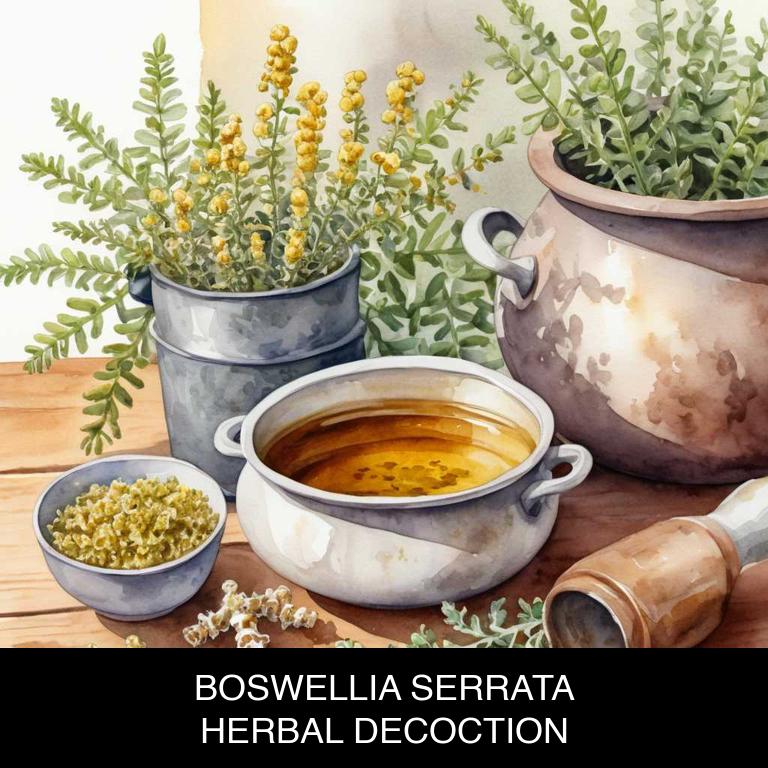
Medicinal Constituents
The list below shows the primary medicinal constituents in Boswellia serrata decoctions that help with joint stiffness.
- Terpenes: These compounds inhibit the enzyme 5-lipoxygenase (5-LOX), which is involved in the production of inflammatory mediators that contribute to joint stiffness and pain.
- Phenolic compounds: These antioxidants help reduce inflammation and oxidative stress in the body, thereby alleviating joint stiffness and discomfort.
- Acyl-11-keto-beta-boswellic acid: This specific boswellic acid has potent anti-inflammatory and anti-arthritic effects, making it a key contributor to the joint-stiffness-relieving properties of Boswellia serrata.
Parts Used
The list below shows the primary parts of frankincense used to make decoctions for joint stiffness.
- Roots: The roots are the primary source of boswellic acids, which are responsible for the anti-inflammatory and pain-relieving properties.
- Rhyzomes: Rhyzomes are a type of underground stem that contains a high concentration of boswellic acids, making them a key component in joint stiffness decoctions.
- Barks: The barks of Boswellia serrata contain boswellic acids and other compounds that help to reduce inflammation and alleviate joint pain.
Quick Recipe
The following recipe gives a procedure to make a basic frankincense for joint stiffness.
- Harvest 30-60 grams of dried boswellia serrata resin, available in most health food stores or online.
- Combine the harvested resin with 2-3 liters of water in a large saucepan.
- Bring the water to a boil over high heat and reduce the heat to medium low.
- Simmer the mixture for 30-60 minutes, or until the decoction has reduced to 1 liter.
- Strain the decoction through a cheesecloth or fine-mesh sieve into a clean glass container.
5. Zingiber officinale
Ginger decoctions helps with joint stiffness because its bioactive compounds, such as gingerols and shogaols, have anti-inflammatory properties that reduce swelling and pain in joints.
The decoction's warm, soothing properties also increase blood circulation to the affected areas, promoting relaxation of tense muscles and reducing stiffness. Additionally, ginger's antioxidant properties help protect joints from oxidative damage, which can contribute to joint degeneration.
By regularly consuming herbal ginger decoctions, individuals may experience relief from joint stiffness and improved mobility.
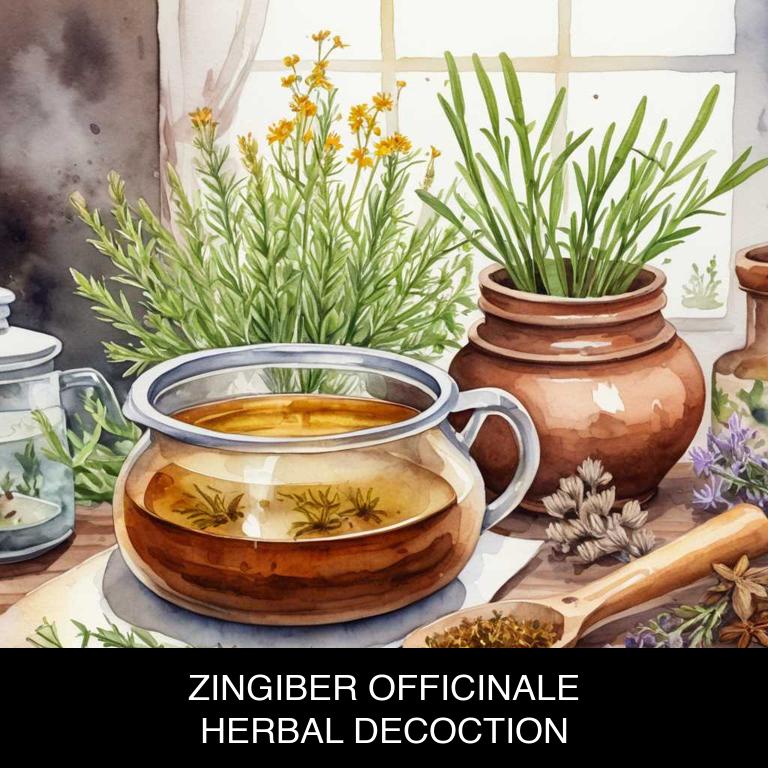
Medicinal Constituents
The list below shows the primary medicinal constituents in Zingiber officinale decoctions that help with joint stiffness.
- Gingerols: These sesquiterpene compounds are responsible for the anti-inflammatory and analgesic properties of ginger, helping to reduce joint stiffness by inhibiting the production of pro-inflammatory enzymes and mediators.
- Shogaols: Similar to gingerols, shogaols are also sesquiterpene compounds found in ginger that exhibit potent anti-inflammatory and pain-relieving effects, contributing to the alleviation of joint stiffness.
- 6-gingerol: This particular gingerol has been shown to have potent anti-inflammatory and antioxidant properties, helping to reduce joint inflammation and oxidative stress, which can contribute to joint stiffness.
Parts Used
The list below shows the primary parts of ginger used to make decoctions for joint stiffness.
- Rhyzomes: Rhyzomes are the most commonly used part of ginger due to their high concentration of bioactive compounds that help reduce inflammation and alleviate joint stiffness.
- Roots: The roots of ginger are also used to make decoctions, as they contain similar bioactive compounds to the rhyzomes, which can help ease joint pain and stiffness.
- Barks: The barks of ginger have anti-inflammatory properties, which make them useful for making decoctions that can help reduce joint inflammation and alleviate stiffness.
Quick Recipe
The following recipe gives a procedure to make a basic ginger for joint stiffness.
- Harvest 1-2 inches of fresh zingiber officinale root in the morning for optimal medicinal properties.
- Wash the harvested root thoroughly with cold running water to remove any dirt or debris.
- Slice the root into thin pieces using a sharp knife to increase surface area for infusion.
- Combine 1 teaspoon of sliced root with 1 cup of boiling water in a heat-resistant glass cup.
- Steep the mixture for 5-7 minutes to allow the active compounds to infuse into the water.
6. Withania somnifera
Ashwagandha decoctions helps with joint stiffness because of its unique ability to reduce inflammation and alleviate pain.
The herbs' active compounds, such as withanolides and glycosides, work synergistically to calm down inflamed joints, thereby reducing stiffness and improving mobility. Additionally, ashwagandha's antioxidant properties help to neutralize free radicals that can damage joint tissues, promoting healthy joint function and overall well-being.
As a result, regular consumption of ashwagandha decoctions can lead to significant improvements in joint flexibility and comfort.
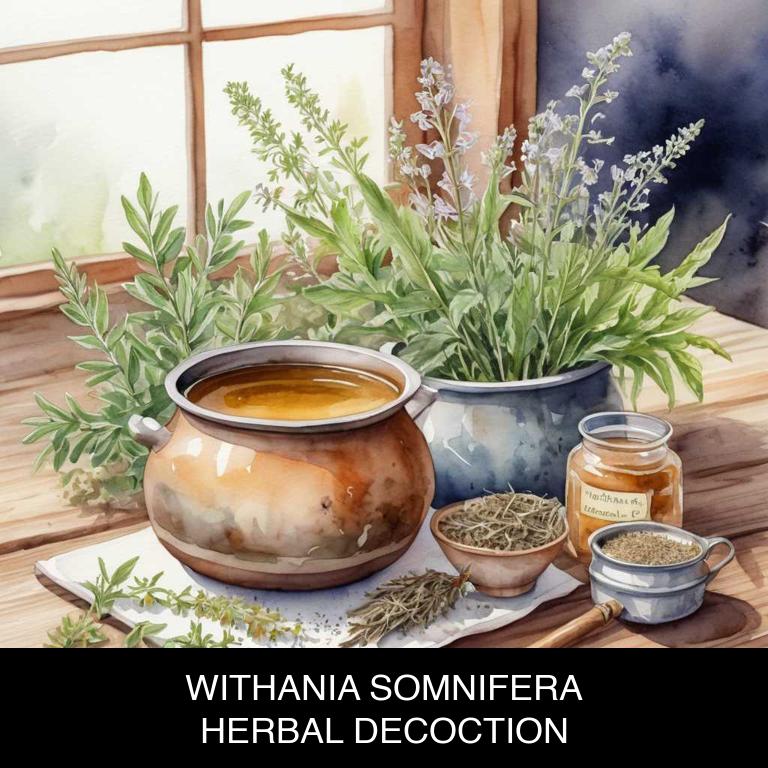
Medicinal Constituents
The list below shows the primary medicinal constituents in Withania somnifera decoctions that help with joint stiffness.
- Withanolides: These steroidal lactones help with joint stiffness by reducing inflammation and oxidative stress in the joints, thereby alleviating pain and discomfort.
- Alkaloids: These compounds exhibit anti-inflammatory and immunomodulatory properties, which help to reduce joint inflammation and stiffness.
- Saponins: These glycosidic compounds exhibit anti-inflammatory and antioxidant properties, which help to reduce oxidative stress and inflammation in the joints, thereby alleviating joint stiffness.
Parts Used
The list below shows the primary parts of ashwagandha used to make decoctions for joint stiffness.
- Roots: The root is the most commonly used part due to its high concentration of bioactive compounds, particularly withanolides, which are responsible for its medicinal properties.
- Leaves: The leaves contain withanolides and other secondary metabolites, contributing to their anti-inflammatory and analgesic effects, making them effective for joint stiffness.
- Seeds: The seeds of Withania somnifera contain withanolides and other compounds that have been shown to reduce inflammation and relieve joint pain, making them a popular choice for decoctions.
Quick Recipe
The following recipe gives a procedure to make a basic ashwagandha for joint stiffness.
- Measure 2-4 grams of dried withania somnifera root powder for decoction.
- Combine the measured root powder with 1 liter of water in a saucepan.
- Heat the mixture over medium heat for 10-15 minutes or until it reduces by half.
- Strain the decoction through a cheesecloth or fine-mesh sieve into a clean container.
- Allow the decoction to cool completely before serving or storing it in the refrigerator.
7. Urtica dioica
Stinging nettle decoctions helps with joint stiffness because of its unique composition, which includes compounds like naringenin and chlorogenic acid.
These bioactive agents help to reduce inflammation and relax muscle spasms, thereby alleviating stiffness and pain in the joints. Additionally, stinging nettle's natural anti-inflammatory properties help to reduce swelling and ease discomfort, making it a popular herbal remedy for managing joint conditions such as arthritis and gout.
By drinking regular decoctions, individuals can experience significant relief from stiff and creaky joints.
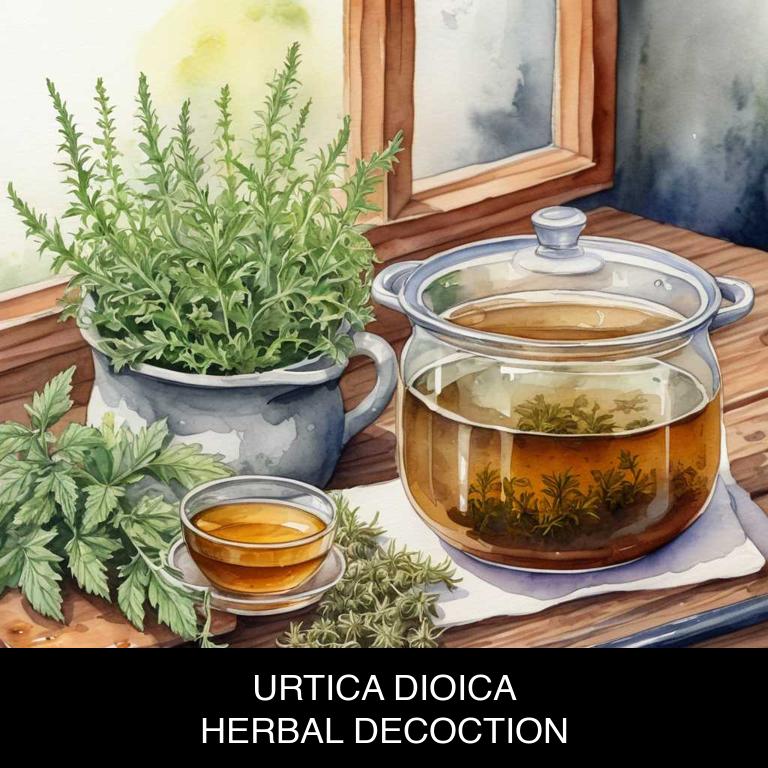
Medicinal Constituents
The list below shows the primary medicinal constituents in Urtica dioica decoctions that help with joint stiffness.
- Triterpenoids: These compounds in Urtica dioica decoctions have anti-inflammatory properties, which help reduce joint stiffness by decreasing swelling and pain in the affected areas.
- Phenolic acids: The phenolic acids present in the decoction have antioxidant and anti-inflammatory effects, which alleviate joint stiffness by reducing oxidative stress and inflammation in the joints.
- Histamine-releasing quercetin: Quercetin, a flavonoid present in Urtica dioica, is known to have anti-inflammatory properties and can help with joint stiffness by reducing inflammation and pain in the joints.
Parts Used
The list below shows the primary parts of stinging nettle used to make decoctions for joint stiffness.
- Leaves: The leaves of Urtica dioica are commonly used to make decoctions for joint stiffness due to their high content of anti-inflammatory compounds.
- Roots: The roots are often used to make decoctions for joint stiffness due to their rich store of antioxidants and anti-inflammatory properties.
- Stems: The stems of Urtica dioica are used in decoctions for joint stiffness due to their ability to reduce inflammation and promote healing.
Quick Recipe
The following recipe gives a procedure to make a basic stinging nettle for joint stiffness.
- Gather 1/2 cup of fresh urtica dioica leaves and stems or 2 tablespoons of dried leaves and stems.
- Clean the urtica dioica thoroughly by rinsing it with cold water to remove dirt and debris.
- Combine the urtica dioica with 2 cups of water in a saucepan and bring to a boil.
- Reduce heat and simmer the mixture for 5-10 minutes or until the liquid has reduced slightly.
- Strain the decoction through a cheesecloth or a fine-mesh sieve into a clean container.
8. Salix alba
White willow decoctions helps with joint stiffness because of its high salicin content, a natural pain-reliever similar to aspirin.
The decoction works by reducing inflammation and alleviating discomfort in the joints, making it an effective treatment for conditions like osteoarthritis and rheumatoid arthritis.
As the salicin is absorbed into the bloodstream, it targets specific pain receptors, providing relief from stiffness and discomfort, allowing individuals to move freely and comfortably again.
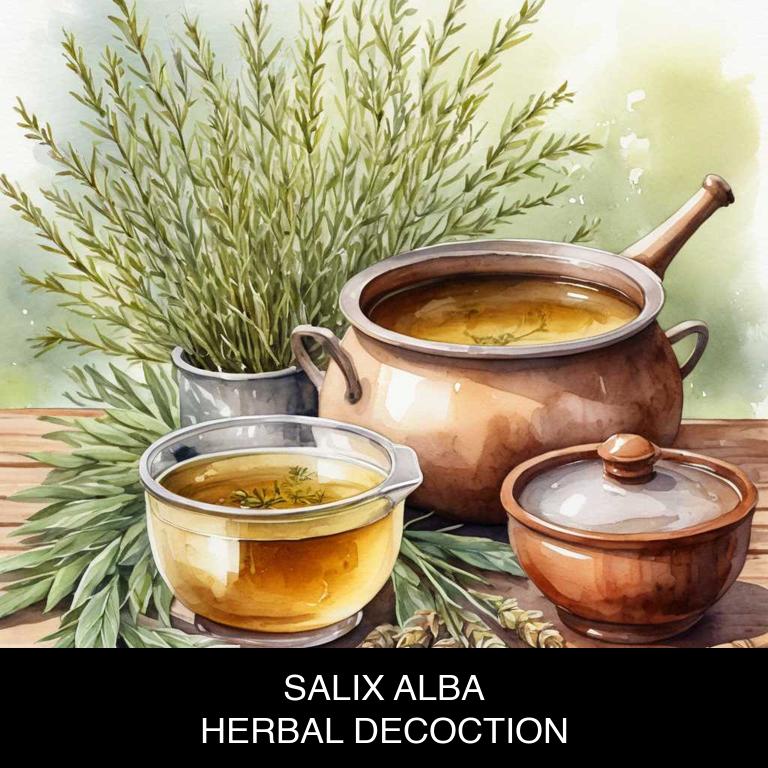
Medicinal Constituents
The list below shows the primary medicinal constituents in Salix alba decoctions that help with joint stiffness.
- Salicin: A phenolic glycoside, salicin helps with joint stiffness by acting as a natural anti-inflammatory and pain reliever, similar to aspirin.
- Salicortin: A triterpenoid saponin, salicortin has anti-inflammatory and antioxidant properties that help reduce joint inflammation and alleviate stiffness.
- Salicilin: A phenolic compound, salicilin has anti-inflammatory and analgesic properties that help reduce joint pain and stiffness, making it an effective remedy for conditions like arthritis.
Parts Used
The list below shows the primary parts of white willow used to make decoctions for joint stiffness.
- Barks: The barks of Salix alba are commonly used to make decoctions for joint stiffness due to their anti-inflammatory and analgesic properties.
- Leaves: The leaves of Salix alba are used to make decoctions for joint stiffness due to their anti-inflammatory and antioxidant properties.
- Buds: The buds of Salix alba are used to make decoctions for joint stiffness due to their anti-inflammatory and analgesic properties.
Quick Recipe
The following recipe gives a procedure to make a basic white willow for joint stiffness.
- Harvest 20-30 grams of dried white willow bark and store it in a clean container for future use.
- Chop the dried white willow bark into small pieces using a mortar and pestle to increase surface area.
- Combine the chopped white willow bark with 1 liter of boiling water in a saucepan to create the decoction.
- Allow the decoction to steep for 10-15 minutes before reducing heat to a simmer and continuing to cook.
- Strain the decoction through a cheesecloth or fine-mesh sieve into a clean container to remove solids.
9. Sambucus nigra
Elder decoctions helps with joint stiffness because they contain powerful anti-inflammatory compounds that reduce swelling and ease pain.
The decotions' flavonoids, such as quercetin, work to block pro-inflammatory enzymes, while the terpenes like beta-caryophyllene exhibit potent analgesic properties. Additionally, elder's antioxidants help protect joints from oxidative damage caused by free radicals.
By addressing both inflammation and oxidative stress, herbal elder decoctions offer a natural, holistic approach to managing joint stiffness and promoting overall joint health.
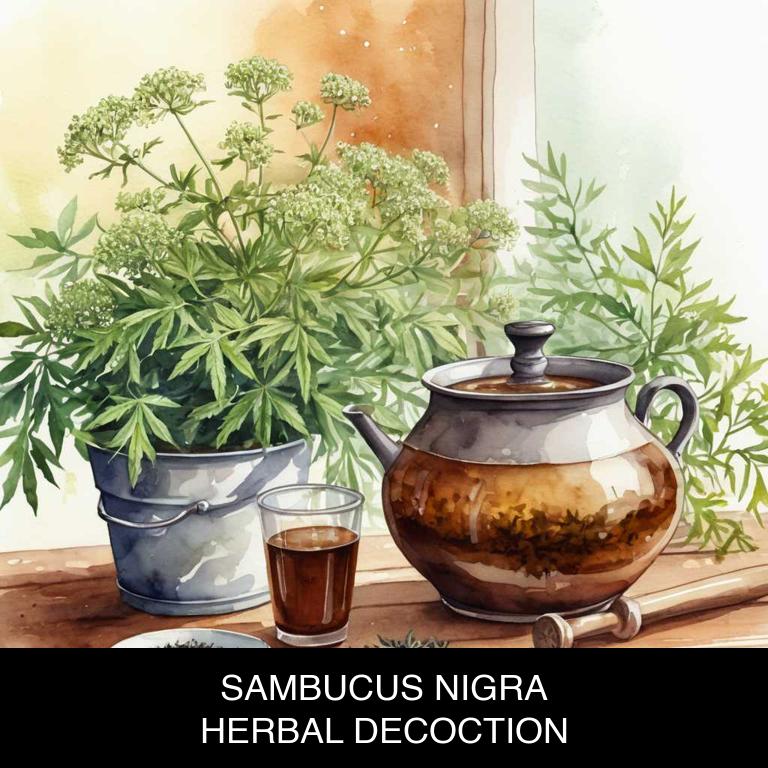
Medicinal Constituents
The list below shows the primary medicinal constituents in Sambucus nigra decoctions that help with joint stiffness.
- Flavonoids: These plant compounds help with joint stiffness by reducing inflammation and modulating the immune response, which can alleviate pain and discomfort associated with joint issues.
- Phenolic acids: Phenolic acids in Sambucus nigra decoctions have anti-inflammatory and antioxidant properties, which can help reduce joint inflammation and oxidative stress, thereby alleviating joint stiffness and pain.
- Anthocyanins: Anthocyanins are powerful antioxidants that help mitigate joint inflammation and oxidative stress, contributing to reduced joint stiffness and pain by protecting joint tissues from damage caused by free radicals.
Parts Used
The list below shows the primary parts of elder used to make decoctions for joint stiffness.
- Flowers: The flowers of Sambucus nigra are commonly used to make decoctions for joint stiffness due to their high content of bioactive compounds that help reduce inflammation.
- Leaves: The leaves of Sambucus nigra are used for their anti-inflammatory properties, which help alleviate joint stiffness and pain.
- Barks: The barks of Sambucus nigra are used to make decoctions for joint stiffness due to their ability to reduce inflammation and promote healing in the affected areas.
Quick Recipe
The following recipe gives a procedure to make a basic elder for joint stiffness.
- Harvest approximately 30g of fresh sambucus nigra berries from the wild or cultivated source.
- Chop the berries into small pieces and combine with 500ml of water in a saucepan.
- Bring the mixture to a boil over medium heat for 10-15 minutes then reduce heat.
- Simmer the decoction for an additional 20-30 minutes or until it has reduced to 250ml.
- Strain the decoction through a cheesecloth or fine mesh into a clean container.
10. Yucca schidigera
Mojave yucca decoctions helps with joint stiffness because its rich antioxidant properties help to reduce inflammation and alleviate pain in the joints.
The decoction's anti-inflammatory compounds work by inhibiting the production of prostaglandins, which are hormone-like substances that cause pain and swelling in the joints.
Additionally, Mojave yucca decoctions contain saponins, which have been shown to stimulate the repair and regeneration of damaged connective tissue, helping to restore flexibility and reduce stiffness in the joints.
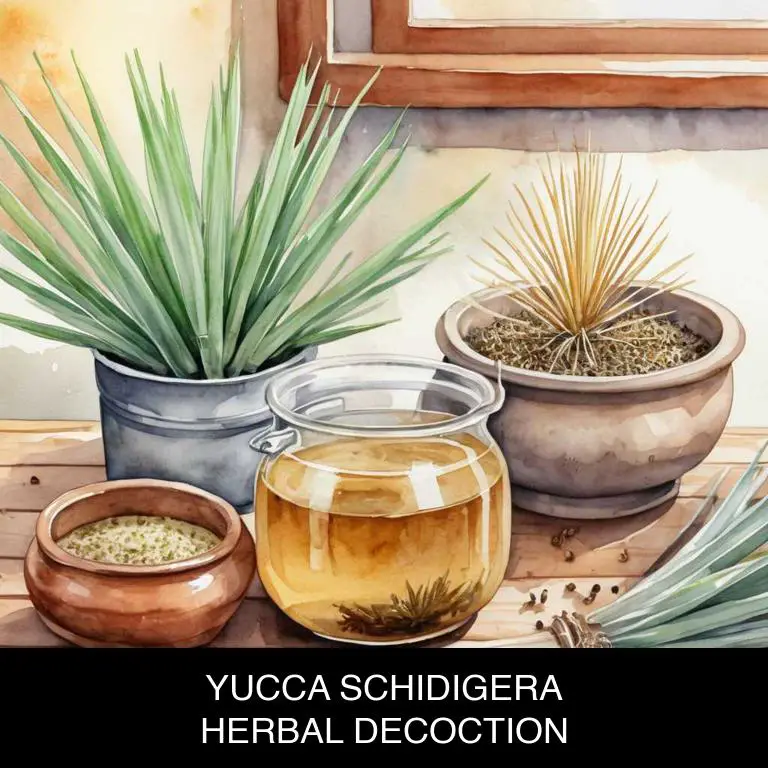
Medicinal Constituents
The list below shows the primary medicinal constituents in Yucca schidigera decoctions that help with joint stiffness.
- Saponins: Saponins in Yucca schidigera decoctions have anti-inflammatory properties, which help reduce swelling and alleviate joint stiffness.
- Polysaccharides: Polysaccharides in Yucca schidigera decoctions have been shown to stimulate the immune system, reducing inflammation and alleviating joint pain and stiffness.
- Flavonoids: Flavonoids in Yucca schidigera decoctions have antioxidant properties, which help protect joints from oxidative stress, reducing inflammation and alleviating joint stiffness.
Parts Used
The list below shows the primary parts of mojave yucca used to make decoctions for joint stiffness.
- Stems: Saponins extracted from the stems help reduce inflammation and alleviate joint pain.
- Leaves: Saponins and other compounds in the leaves have anti-inflammatory properties, which help to ease joint stiffness.
- Roots: The roots of Yucca schidigera are a rich source of saponins, which help to reduce joint inflammation and promote flexibility.
Quick Recipe
The following recipe gives a procedure to make a basic mojave yucca for joint stiffness.
- Harvest 100g of fresh or dried yucca schidigera roots and clean them thoroughly under running water.
- Crush 30g of the cleaned roots into smaller pieces using a mortar and pestle for 5 minutes.
- Combine the crushed roots with 500ml of boiling water in a saucepan and steep for 20-30 minutes.
- Strain the decoction through a cheesecloth or a fine-mesh sieve into a clean container.
- Discard the solids and store the decoction in the refrigerator for up to 3 days.
What is the best combination of herbal decoctions to use for joint stiffness?
The best combination of herbal decoctions that help with joint stiffness is a blend of turmeric, ginger, and willow bark.
Turmeric contains curcumin, a potent anti-inflammatory compound that reduces joint pain and inflammation. Ginger has anti-inflammatory and antioxidant properties that help to reduce joint stiffness and promote healing. Willow bark contains salicin, a natural pain reliever similar to aspirin.
When combined, these three decoctions create a powerful formula to alleviate joint stiffness, inflammation, and pain, promoting overall joint health and well-being.
What ailments similar to joint stiffness are treated with herbal decoctions?
Ailments similar to joint stiffness that are treated with herbal decoctions are various musculoskeletal conditions, including rheumatoid arthritis, gout, and osteoarthritis.
Herbal decoctions may also be used to alleviate symptoms of fibromyalgia, tendinitis, and bursitis.
Additionally, decoctions made from herbs like ginger, turmeric, and willow bark have been traditionally used to treat headaches, migraines, and other types of pain associated with joint stiffness.